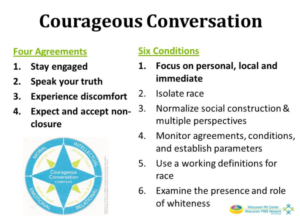Share your equity purpose with these 5 prompts
An equity-focused purpose can be a source of power to create urgency, build momentum, and transform your school. It can also build community. Leaders who know their purpose and know when to share it can inspire change, through tapping into our emotional core.
We show up to work every day and fulfill the duties of our job. The work, if you are in urban or inner city schools, is especially challenging. We work long hours, deal with setbacks, and keep pushing. But why?
Do you remember why you got into this work? And if you know why, does anyone else know?
I remember standing in front of the staff that I was selected to lead. It was Day 1 of “welcome back PD,” and I was sweating.
Sure, I had a powerpoint and a purple tie, but much more was needed. What was everyone thinking? Would they trust me? In all honesty, I was appointed. I was not chosen by a hiring team. How would I get them to know me, know my story, and see my vision?
What should I share? Who am I?
START WITH YOUR WHY
It is paramount that you reflect on your purpose, your philosophy of education, and your personal mission. When times get tough, this is all we have. When people question your motives, you can rest on “your why”.
Simon Sinek, in his many presentations and his book “Start with Why,” speaks about the power of communicating your purpose, or “your why.” Sinek says, “people don’t buy what you do, they buy why you do it.”
So what are you selling?
And if you aren’t selling anything, what social change are you leading?
Applying this to schools, your staff doesn’t follow you for what you want done, they follow you for why you want to change things. This taps into the limbic portion of the brain, and attaches to our feelings.
Check out Simon Sinek’s explanation of this:
5 Questions to reflect on your Purpose
- How were your upbringing and formative years of schooling? Did you experience any issues of discrimination, oppression, or inequity? Did you witness others? How were you affected?
- Why did you get into the education field? What equity issue were you hoping to address? What were your dreams?
- What is your vision for education? What do you hope would be true for marginalized, underserved, and oppressed groups of students?
- How does your identity relate to your vision for an ideal school? What school would address the issues you noticed or experienced?
- What is your vision for the organization that you lead? How does this vision connect to your identity?
Now that you have answers to those questions, think how you might weave them into a story that uncovers a layer about your identity. Write it down!
Once you have a clear story and purpose, share it!
5 places Where you can share your story
- If you are a new leader, your opening staff meeting is a great place. Use a PowerPoint or bring in some artifacts. Nothing wrong with a little show and tell.
- Share it with students in an assembly. Start with a personal story. Model vulnerability.
- Open up a parent meeting with some anecdotes about your school experience or a struggle you went through in your childhood.
- Add it to your website, and it is ok to include something fun to remind everyone that you are human too.
- Revisit when introducing a new initiative or big change. Let everyone know how it connects to your purpose.

Glenn Singleton speaks about the power of sharing your racial autobiography, as a method to set a foundation to have courageous conversations about race. You need a baseline relationship in order to talk through conflict or tension. And relationships start with vulnerability. Race can be extended to other aspects of your identity, including class, gender, citizenship, and sexuality. Telling our stories humanizes us, and allows for deeper connections and more dynamic equity work. Also, it also helps you articulate your purpose and philosophy of education.

Teachers have power in articulating their why
Many students will ask “why does any of this matter” and “why do you even care?” Oppressed students will question of you are their side or on the side of a system that has betrayed them. How will you make it clear to them, that you are in solidarity with their struggle? It helps to understand your own struggles and let them know.Why?Why do you come to work?
Tell them. Remind them. Connect your equity purpose to the content. And connect it to their issues. Watch trust get built and witness your students awaken.
If you have never told students your why, tell them tomorrow.
School change starts with purpose
This is especially important when talking about school change, new initiatives, and raising expectations. People want to know that you are invested at the deepest level. Your team wants to know why. Not just for a paycheck but for a personal calling.
Your community wants to know where you are coming from. Everyone wants to know why!
When I shared my story of growing up in poverty and sharing how I lost my father to alcoholism when I was 5 years old. It was silent and the mood was serious. I’m sure that it was more than folks expected at our welcome back PD, on my first official day. But that is who I am. That can along with lots of successes and celebrations. I connected this to my vision of Love, Literacy, and Liberation. I leveraged this as to why we need to do better for our students.
Later, this prompted other staff to step up and share their stories, “their why” as we call it, and now we do it every other week. Our staff wanted to know why their colleagues show up. It’s a fantastic ritual or “keystone habit”, that unites us and centers us before we get to our learning.
Conclusion
When people know you care, they better understand what you care about. Start by telling your organization who you are, what matters to you, and what in your past led you to here, a clear foundation is set. If you are leading, your motives are always being scrutinized and sometimes hypothesized. So make it plain. Sometimes people will try to call out your self-interest, however when you are clear about why you are in this work it is much harder. You can return to your why (I need a reminder myself) to help frame change. But be sure to write it down and practice sharing it with a close colleague, friend, or loved one. And share it!
How and where do you share your purpose?
How did your colleagues and team respond?

